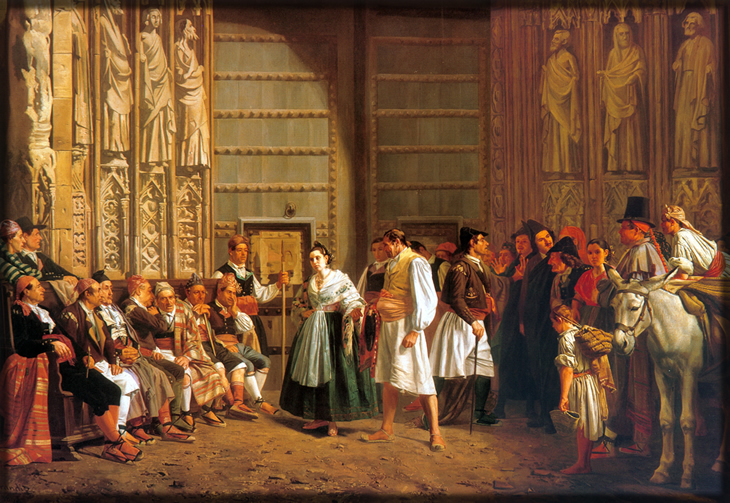Tribunal De Las Aguas on:
[Wikipedia]
[Google]
[Amazon]
The Water Tribunal of the plain of Valencia, also known as the Tribunal of Waters ( ca-valencia, Tribunal de les Aigües de València), is an institution of justice to settle disputes arising from the use of irrigation water by farmers in several Irrigation Communities ( ca-valencia, Comunitats de Regants) and
 The Tribunal's origin is not fully known, although it is likely to have evolved from previous Andalusian traditions. Some historians, such as José Vicente Gómez Bayarri, placed its origins in Roman times.
The most widespread theory is advocated by Francisco Javier Borrull. His hypothesis is that there was already a precedent in Roman times, but the foundation as it operates today occurred during the reigns of the Caliphs Abd-ar-Rahman III and
The Tribunal's origin is not fully known, although it is likely to have evolved from previous Andalusian traditions. Some historians, such as José Vicente Gómez Bayarri, placed its origins in Roman times.
The most widespread theory is advocated by Francisco Javier Borrull. His hypothesis is that there was already a precedent in Roman times, but the foundation as it operates today occurred during the reigns of the Caliphs Abd-ar-Rahman III and
Official Tribunal website
UNESCO website
Description.
Vicente Giner Boira Archive (Biblioteca Valenciana)
{{Authority control Intangible Cultural Heritage of Humanity Province of Valencia Agricultural organisations based in Spain Irrigation in Spain
canal
Canals or artificial waterways are waterways or engineered channels built for drainage management (e.g. flood control and irrigation) or for conveyancing water transport vehicles (e.g. water taxi). They carry free, calm surface flo ...
s (''Quart'', ''Benàger i Faitanar'', ''Tormos'', ''Mislata'', ''Mestalla'', ''Favara'', ''Rascanya'', ''Rovella'' and ''Xirivella'') in the Horta de València
The Horta of Valencia ( va, L'Horta de València; es, Huerta de Valencia) is a historical comarca and urban area of Valencian Community. The Horta of Valencia consists of Valencia and three comarcas: Horta Nord, Horta Sud, Horta Oest.
Demogr ...
. It is the World’s Oldest Court and the oldest democratic institution in Europe.
In 2009 it was chosen along with the Council of Wise Men of the plain of Murcia as intangible cultural heritage by UNESCO
The United Nations Educational, Scientific and Cultural Organization is a specialized agency of the United Nations (UN) aimed at promoting world peace and security through international cooperation in education, arts, sciences and culture. It ...
.
Proceedings of the Tribunal
The Tribunal is a customary court. It consists of one representative, called ''síndic'' ( syndic), from each of the Irrigation Communities—nine in total—and one among them is elected president for a period of two years. Every Thursday the Tribunal meets in public and an administrative session at the Casa Vestidor at the Plaça de la Mare de Déu ofValencia
Valencia ( va, València) is the capital of the autonomous community of Valencia and the third-most populated municipality in Spain, with 791,413 inhabitants. It is also the capital of the province of the same name. The wider urban area al ...
to discuss various issues, mainly the distribution of water. On public holidays that fall on a Thursday, the Water Court meets on the preceding Wednesday. That is when the bailiff, with the permission of the president, calls for cases from each of the canals in turn, with the traditional phrase "''denunciants de la séquia de...!''" ("claimants from the irrigation canal of...!"). The trial takes place quickly and is completely in Valencian
Valencian () or Valencian language () is the official, historical and traditional name used in the Valencian Community (Spain), and unofficially in the El Carche comarca in Murcia (Spain), to refer to the Romance language also known as Catal ...
.
Each complainant puts his case before the Tribunal and then the accused defends himself and answers questions. It is then when the Tribunal, with the exception of the trustee of the canal in question (to ensure fairness) decides the guilt of the defendant, and if so found, it is the trustee of the canal who imposes the penalty for the offender, according to the ''Bylaws of the Irrigation Communities'' ( ca-valencia, Ordenances de la pròpia Comunitat de Regants). The court is purely oral—there is nothing done in writing and no records are kept.
History
Al-Hakam II
Al-Hakam II, also known as Abū al-ʿĀṣ al-Mustanṣir bi-Llāh al-Hakam b. ʿAbd al-Raḥmān (; January 13, 915 – October 16, 976), was the Caliph of Córdoba. He was the second ''Umayyad'' Caliph of Córdoba in Al-Andalus, and son of Ab ...
, specifically in 960CE. Borrull's reason was that during the reign of these two Caliphs there was an era of complete peace on the Iberian peninsula and, as a result, it must have been founded then. In fact, the millennial anniversary of the founding of the Water Tribunal took place in 1960, led by Vicente Giner Boira, legal adviser to the Tribunal at the time, and leading proponent of this theory in the twentieth century.
See also
* Council of Wise Men of the plain of MurciaReferences
External links
Official Tribunal website
UNESCO website
Description.
Vicente Giner Boira Archive (Biblioteca Valenciana)
{{Authority control Intangible Cultural Heritage of Humanity Province of Valencia Agricultural organisations based in Spain Irrigation in Spain